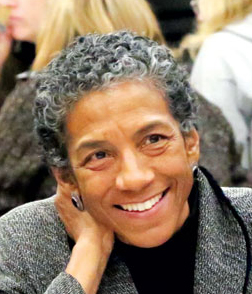Note to Front Porch readers: In past years we have run the League of Women Voters description of ballot issues and the pro and con statements they collect. Because that information was not available by press time for all the ballot issues, we made the space available for op-eds. Though we were unable to get pro and con on every issue, this offers a first look at all the issues on the Denver ballot. The League of Women Voters pamphlet on the state marijuana question, along with voter information, can be downloaded here.
![]()
Denver School Board
At-Large Seat
 Happy Haynes
Happy Haynes
Since I was elected to the School Board in 2011, there has been a lot of progress toward our goal of ensuring that every student receives a quality education and the opportunity for a bright future. Yet, much remains to be done and we are still too far from accomplishing the changes that are needed.
Our kids need someone who won’t quit until we have reached our goals and who believes fervently that we can get there. More than ever, I am fueled by a passion to overcome the challenges our district faces, to find creative solutions and to engage our entire and wonderfully diverse community in the effort to achieve success.
This past year, the Board approved the Denver Plan 2020 with ambitious goals to dramatically boost our graduation rates and college and career readiness, increase school readiness for our earliest learners, demonstrate growth and success for the whole child, close the opportunity gap and ensure great schools in every neighborhood. As President of the Board, I was proud to lead that effort along with my colleague and Vice President, Anne Rowe, and other Board members. This plan acknowledges the tremendous challenges we still face with openness and honesty and yet, commits boldly to a plan of action to achieve our vision that Every Child Succeeds! Visit: www.happyhaynesfordenverskids.com
 Robert Speth
Robert Speth
Only one of every five DPS ninth graders graduate in four years ready for college. The achievement gap is persistent. Clearly, the policies of the past 10 years are not working. My opponent is part of a school board that has rubber-stamped every district recommendation since 2013. These policies are failing our children. The district has failed to engage communities that it is supposed to serve. I am a parent of two DPS children, and I live this reality every day. If elected, I will advocate for the following policies:
Strong Neighborhood Schools: Every student should have the option to attend a strong neighborhood school with a well rounded curriculum. We need to stop the trend of outsourcing Denver’s public schools to private corporations.
Support for Teachers: The trend of privatization means that many of our students are being taught by non-certified teachers. We need to hire top notch professional teachers and administrators who will work in a tight partnership with the parent community.
Community collaboration: I will listen to what our communities really need, and I will work with parents, school leaders, and community members to achieve the best outcome for our students. The choice in this election is clear. Let’s work together and bring True Reform to DPS. Learn more: www.spethforstudents.org.
State Ballot BB — Denver Ballot 2B
BB and 2B—Marijuana Tax Retention
Yes on BB and 2B By State Senator Pat Steadman, District 31 and author of Prop. BB
Colorado voters will decide this November whether the state should stay the course with new taxes on legal marijuana sales. Due to a technical error in the “Blue Book” mailed to voters in 2013, all of the revenue from the first full year of the newly approved taxes on retail marijuana is subject to refund. We’re now being asked to vote a third time on marijuana and taxes.
In 2012, Colorado voters passed Amendment 64, a constitutional amendment that legalized marijuana and directed the state legislature to pass laws to regulate and tax this new industry. The following November voters approved Proposition AA, a measure referred by the legislature to impose new taxes on legal marijuana cultivation and sales. Prop AA passed overwhelmingly with 65% of the vote.
Colorado’s Constitution has special rules for approving new taxes. Tax increases are subject to voter approval, the language of the ballot question is dictated by the constitution, and a voter information booklet (the “Blue Book”) is mailed to all voting households with mandated information about the proposed new tax. All of these steps were followed with Prop AA, but the Blue Book estimate of total state revenues for the upcoming year, required by our state constitution, turned out to be wrong. State economists failed to anticipate how quickly Colorado’s economy was recovering from The Great Recession and they underestimated total state revenue for the year. This error triggers a refund.
Our constitution allows voters to call the shots. In refund situations voters can authorize retention of tax revenue and prevent it from being refunded. That’s why Proposition BB is on the ballot. With strong bipartisan support the Joint Budget Committee sponsored legislation to seek voter approval to keep all $66 million from the first year of newly approved marijuana taxes.
Over three-fourths of the members of the General Assembly voted to put Prop BB on the ballot. We did this because we respect the wishes of the voters, and voters have made their intentions quite clear. The year immediately following a 65% vote in favor of a new tax is not the time to nullify the tax by refunding all of it to taxpayers. Voters want marijuana to be taxed.
If voters approve Prop BB the state will keep and spend just over $66 million in marijuana tax revenue. Prop BB spells out how most of the revenue would be allocated, with the first $40 million going to the school construction program identified in Amendment 64. This is where voters wanted marijuana taxes to go, and if they vote YES on Prop BB that’s what will happen. Another $12 million will go to youth services, marijuana education and prevention, substance use treatment and law enforcement programs. Because the first year of the new taxes did not conclude until after the legislature adjourned, the total amount of the refund was not known when Prop BB was written and not all of the money was allocated. The remainder will be decided during the 2016 legislative session.
I’m urging everyone to vote YES on Prop BB. Regardless of your position on marijuana legalization, new taxes are part of the package. Taxation is an important component of regulation and control. Revenue from marijuana taxes is being used to mitigate potential adverse impacts of legalization, and, as voters intended, the money is helping build and repair school facilities across the state. If Prop BB fails, then all the taxes collected in the first year will be refunded back to the marijuana growers and consumers who paid them, in addition to a portion that would be refunded to all taxpayers statewide. This isn’t what voters had in mind when they said to legalize it and tax it. Stay the course by voting YES.
Note to Denver Voters About 2B:
Also, please vote YES on Question 2B. It turns out Denver’s new marijuana taxes ran into the same problem, and Question 2B allows the City to keep and spend the revenue rather than refund it to taxpayers. It also would allow the city to continue to levy the special marijuana sales tax, as approved by voters in 2013. $5,290,016 would have to be returned if voters do not approve this measure.
Denver Ballot Issues
Denver 1A—Adams County Intergovermental Agreement/Revenue Sharing
This ballot question asks voters if Denver can amend the agreements with Adams County about annexation and development at DIA to provide additional opportunities for commercial development at DIA and to share half the available tax revenue derived by Denver from such development without imposing any new tax or increasing any tax rate.
The Front Porch was unable to find someone to write either in support or in opposition to this question.
Denver 2A—College Affordability
Yes on 2A By Chris Herndon, Councilman, District 8
Denver’s economic future looks bright and we need to make sure we’re prepared to capitalize on opportunities that will support our long-term success. This November, we’ll vote on two major undertakings that will shape our area for decades: the redevelopment of the National Western Stock Show Complex (Referendum 2C), and future development agreements around Denver International Airport (Referendum 2B).
Land development and the built environment are important, but we also have to consider building and developing the skills and potential of our own residents so they can participate in our growing economy. That’s why Referendum 2A—the College Matters proposal—matters.
Five years from now, we expect 74% of jobs in Denver to require a post-secondary degree. Many Denver kids who have the grades, the smarts and the determination to earn a college degree don’t have the opportunity to get there because of financial constraints. With only a high school diploma, they can’t compete for many of the jobs in Denver’s economic landscape.
College Matters will help give these kids a fair shot at college by supporting scholarships and student loan debt relief, funded through a sales tax of less than one penny on ten dollars. It is a pay-for-performance model, meaning that only students who are making progress on their certificate or degree are eligible to receive support. The program also focuses on helping students succeed with academic and financial aid counseling to help ensure they stay on track and make it to graduation.
This investment is aligned with the City’s strategic investments in attracting jobs and creating economic opportunity. We invest in job recruitment and retention programs, capital improvements and neighborhood amenities, and a wide range of workforce development and training programs. We know that people with postsecondary educations have much greater job opportunities, earn higher wages, contribute more in taxes that support critical public services, and are less likely to have to depend on costly programs like unemployment and food and housing assistance.
Our commitments to the innovative Denver Preschool Program and K-12 schools exemplify our willingness to invest in our youth and their potential. 2A will complete that education pipeline and help promote economic mobility by increasing access to the opportunities Denver has to offer.
The bottom line is that the College Matters program will help give hard-working Denver students a fair shot at an education that will both change their lives and support our economy.
No on 2A By Mary Beth Susman, Councilwoman District 5
While better college access and success is a pressing need, I have considerable reservations about the college affordability proposal on the Denver ballot this fall.
First, Denver has enormous obligations for infrastructure, safety, human services, etc. Denver is trying to meet affordable housing goals and neighborhood improvements and expecting to ask for support with these and other city needs. How much can our citizens take on?
Second, Colorado public higher education is the purview of the state, not city government. Because of the constitutional division of responsibility, this initiative cannot require accountability to Denver on the part of the receiving colleges. The funds will go to non-profits to provide student support and tuition relief. There is accountability for these non-profits, but the colleges themselves will not account to the city for expenditures or student success rates during the life of this initiative.
And while an educated workforce is an important asset for the city, recipients may attend any Colorado public college with no guarantee that they will return to Denver. It would be more appropriate if the state were to float a tax proposal to support college access, although some issues about college processes bear more scrutiny in general. Present college models may play a bigger part in rising costs than lack of funding.
The Colorado Department of Higher Education’s latest report on graduation rates within four years is just 31.8 percent. The rate of completion at six years is 59.3 percent. Persistence rates are affected by many things. Cost may be one of them, but so is a system that is difficult if you are struggling to maintain a job and family. According to the National Center for Education Statistics, about 40 percent of students in higher ed today are 25 or older, the population more likely to have these responsibilities. (Mystifyingly, this initiative limits eligibility to those who are 24 years or younger.) But most colleges are best organized for the 18- to 22-year-old with the leisure time to attend classes at wildly variable times. Research suggests that re-organizing schedules to create predictable and concentrated class times can do more for successful completion than reducing cost barriers.
Denver has many urgent needs for our city. Taxing Denverites for challenges that are the state’s purview without any accountability to the city from the colleges may be tackling the wrong end of the problem, and definitely with the wrong resources.
Denver 2B—Marijuana Tax Retention
See state ballot issue BB above.
Denver 2C—Revenue Bonds and Tax Extension for the National Western Center and Colorado Convention Center
Yes on 2C By State Senator Michael Johnston
I remember growing up in Colorado, I used to hear people always talk about Denver as a big cow town. Thirty years ago that seemed like something of an insult. Now it actually feels like a prized piece of Colorado’s heritage. When you think about the things that make Denver different in the national brand, it’s not just our access to mountains and rivers, to skiing and hiking and biking, or a booming tech economy, or a great finance sector, or a wonderful environment. We are still not Seattle or Portland or Boston because we have a unique link to the American West. No place is that link more powerful or more palpable to all of us than it is at the National Western Stock Show. To many of us it’s probably the place we take our kids in the month of January, but for thousands of Colorado families it is the central driving force of what we do in agriculture and how we do it.
The plan to redevelop the stock show represents a powerful merging of the Colorado of the past and the Colorado of the future. It reinforces our history in agriculture and yet applies that history to a brave new world of technology and research and science that will link the rural world of agriculture with the urban world of economic development and technology through a one of a kind partnership with CSU and the agriculture community. All the while, it will complete the final missing piece of the economic development of North Denver by finally bridging communities that had been forgotten—in Globeville and Elyria and Swansea—that have been hidden under highways and railyards for too long, and connect them now to the economic pipeline that is Downtown Denver, Coors Field and the surrounding RINO area that is burgeoning.
That is why when the opportunity arose in the legislature to sponsor a piece of legislation that would enable the voters to choose if they wanted to keep this iconic piece of Colorado history, and rather than just upgrading it, transform it into a dynamic new lever for economic development in the 21st century, I jumped at the chance. That is also the reason why I am now a passionate supporter of Measure 2C.
No on 2C These arguments in opposition were submitted to the Denver Elections office for the voter Blue Book.
- Citizens of Denver should vote “No” on Referred Question 2C.
- The National Western expansion project is expected to cost $856 million. Of that, $673 million will be city spending, more than $1,000 for every Denver resident. The benefits will overwhelmingly go to a small group of people.
- There has been no analysis presented of alternative ways to more beneficially spend this money. Denver needs money for police and fire protection, improving the jail, affordable housing, assistance to needy individuals and families, streets, bike lanes, parks, recreation facilities and other services. The $778 million the City is proposing to spend for the combined National Western and Convention Center could provide each of the 11 City Council districts with over $70 million in local improvements.
- The 2C financing plan has serious flaws. Good public financing looks to the people who directly benefit from the improvements financed by the debt. However, the City rejected a Stock Show seat tax from the 2C plan, choosing instead to extend an existing tax approved by the voters in 1999 which is due to expire. The improvements financed by new debt will be subsidized by Denver voters and visitors, many of whom never attend the Stock Show.
- No termination date for the 1.75% tax extension is another flaw. The tax should end when the estimated $1.9 billion dollars of principal and interest are paid. Under 2C however, the tax will continue forever, used to pay for Stock
- Show/Convention Center operations, as well as “tourist related projects.” Except, this tax was originally approved by the voters solely for the Convention Center construction. What becomes of the taxes currently being used for these operating expenses? Will this tax finance all of the necessary Stock Show improvements or will additional taxes be requested from the Denver voters?
- The National Western Complex and the Convention Center Expansion are separate issues and should be voted on separately.
- This is a new tax.
- This tax will be paid by Denver citizens unlike taxes directed at tourists such as lodgers’ and car rental taxes.




0 Comments